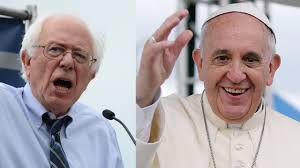Sanders has audience with Francis

VATICAN CITY -- U.S. Presidential candidate Bernie Sanders climaxed his visit to Rome Saturday with a five minute audience with Pope Francis before the pontiff left Italy for a pastoral visit to the Greek island of Lesbos. Sanders was quoted as telling Francis that he “appreciated very much the incredible role that he is carrying out on this planet in discussing themes on the need for an economy based on morality, not on greed”.
Sanders arrived Friday in Rome to attend a high profile conference hosted by the Pontifical Academy of Sciences concerning environmental and social issues.
“Over a century ago, Pope Leo XIII highlighted economic issues and challenges in Rerum Novarum that continue to haunt us today, such as what he called ’the enormous wealth of a few as opposed to the poverty of the many,'” he said, speaking at the conference celebrating the 25th anniversary of an encyclical by Pope John Paul II to mark the end of the Cold War. “That situation is worse today. In the year 2016, the top one percent of the people on this planet own more wealth than the bottom 99 percent, while the wealthiest 60 people — 60 people — own more than the bottom half: three and a half billion people."
The trip has generated controversy. Sanders said he had accepted an invitation by the Vatican. However, last Friday, Margaret Archer, the academy’s president, said that the Vermont senator had solicited the invitation for political aims.
Nevertheless, Sanders said he is deeply excited at the prospect of coming to the Eternal City. While he does not agree with Francis on some moral issues (like gay marriage and abortion), the presidential candidate said he admires the pontiff for his statements about social inequality, capitalism and climate change. “He has played an unbelievable role, an unbelievable role of injecting a moral consequence into the economy,” said Sanders, on MSNBC’s “Morning Joe, “he is talking about the idolatry of money, the worship of money, the greed that’s out there, how our whole culture is based on: ‘I need more and more and more.'”
His campaign staff have underlined the trip, saying that while Hillary Clinton usually meets rich Wall Street representatives, Sanders on the contrary meets those who defend people from poverty and inequality.
In the United States, Pope Francis was often attacked in the past by Republican candidates who considered him too close with liberal political views (for example concerning climate change and capitalism inequality). There was a spat between the Pontiff and the Republican candidate Donald Trump about immigration issues two months ago. Francis said people who want to build walls should not be considered Christian. Trump, who has always claimed to build a wall against Mexican immigrants, answered that none could judge his personal faith and that the Pope was badly advised about him and American problems. The real estate mogul also defined Francis a “very political person."
Mauro della Porta Raffo, a respected Italian journalist who writes about American politics, told Italian Insider: “It is improbable Sanders will meet the Pope: and this element weakens the effect of the announcement. An effect that, in my view, would not be particularly relevant. I do not think that American people would vote Sanders because of this reason”.
However, the event could reiterate the historic connection between American Catholic voters and the Democratic Party: “Until a few years ago, American Catholics voted almost exclusively for the Democratic Party, also because they were politically accepted only in that faction”, said della Porta Raffo, “Just think that in 1928 a so called ‘popish’ politician like Alfred Smith won the Democratic nomination. In American history, the only Catholic president was a Democrat, John F. Kennedy. Nevertheless, today there are many Catholics also in the GOP: many of the Republican presidential candidates this year were Catholic. Catholic Republicans are very interested in moral issues (like gay marriage and abortion)”.
Another important element is the historic attention of American Catholicism to social issues and policies: for example, last February, Cardinal Timothy Dolan gave his strong support to those who were trying to raise New York’s minimum wage.
The pontifical academy conference might represent a new occasion in order to debate concerning issues like inequality and environment. They are themes that Francis has always put at the center of his pastoral teaching. “Laudato si”, his last encyclical letter, dealt with the environmental issue and it was deeply discussed by American public opinion. Also papal attention to immigrants and poverty is strongly known. For this reason, it is possible Bergoglio could find a point of contact with Sanders on these issues.
jp-sg


